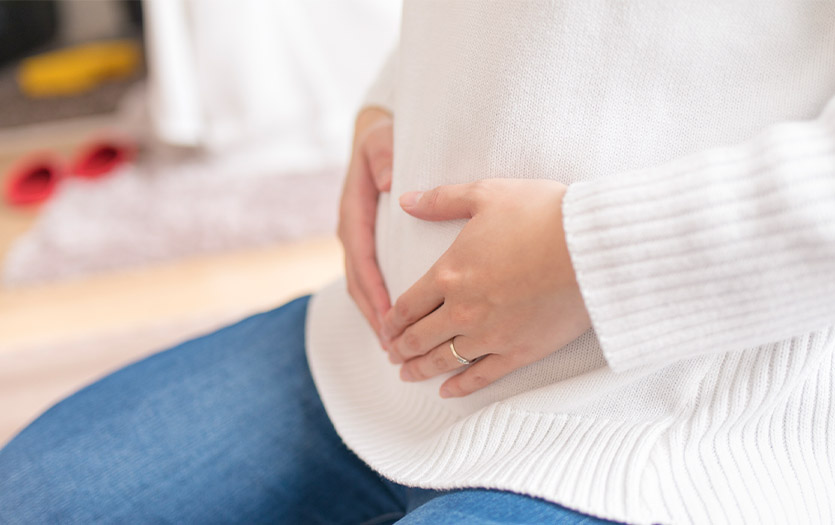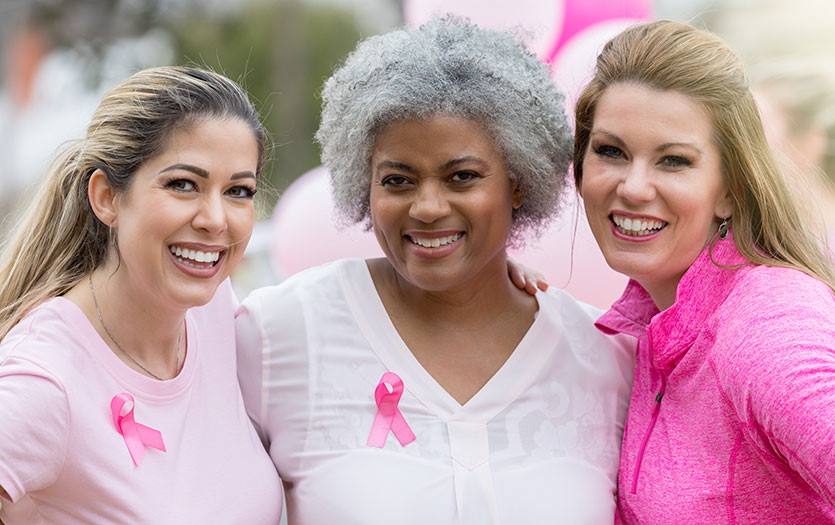
During the first 14 weeks of your pregnancy, your body goes through many changes. You may start to notice changes, both in your body and your emotions. Because each pregnancy and each woman is unique, there's no right way to feel. Some expecting mothers might notice an increase in energy and optimism, while others might be exhausted and sick to their stomachs with “morning sickness.” It varies greatly, but there are some steps that you can take in the early weeks to get things off to the best start possible.
Caring for yourself during weeks 6 to 10 of your pregnancy
Make healthy food choices.
While you be craving certain things, an overall nutritious approach to your diet is best.
- Choose nourishing foods like fruits, vegetables, whole grains, lean proteins and healthy fats.
- Load up on foods that are good sources of calcium, iron and folate. You can try dairy products, dark leafy greens, fortified orange juice and cereals, almonds, broccoli, dried fruit and beans.
- Drink plenty of fluids, especially water. Avoid sodas and other sweetened drinks.
- Avoid foods that could be harmful during pregnancy.
- Do not eat raw or undercooked meat, chicken or fish (such as sushi or raw oysters).
- Heat lunch meats and hot dogs to 165°F before eating them. This reduces your risk of getting sick from bacteria sometimes found in these foods.
- Don't eat shark, swordfish, king mackerel or tilefish. They have high levels of mercury, which can harm the fetus.
- Don't eat unpasteurized soft cheeses, such as Brie, feta, fresh mozzarella and blue cheese. They have bacteria that could be harmful during pregnancy.
- Limit caffeine. If you drink coffee, tea or caffeinated colas, try to have no more than one cup a day.
Be safe during your pregnancy.
Talk to your doctor about your routine and any precautions that might be helpful to protect you and your growing baby.
- Do not touch kitty litter or cat feces. They can cause an infection that could be harmful during pregnancy.
- Avoid things that can make your body too hot, such as a hot tub or sauna. Talk with your doctor before doing anything that raises your body temperature.
- Ask your doctor about getting flu and COVID-19 vaccines to help protect against infections, which can be more severe during pregnancy.
- Avoid alcohol, marijuana and other drugs. If you need help decreasing your use, talk to your doctor.
Cope with morning sickness
It’s common for expecting mothers to experience nausea. Try some of these strategies for taming an upset tummy.
- Sip small amounts of water, juices or shakes. Try drinking between meals, not with meals.
- Eat five or six small meals a day. Try dry toast or crackers when you first get up and eat a bigger breakfast a little later.
- Avoid spicy, greasy and fatty foods.
- When you feel sick, open your windows or go for a short walk to get fresh air.
- Try nausea wristbands or ginger. There are teas and lozenges available to combat an upset stomach.
- Talk to your doctor about over-the-counter products, such as vitamin B6 or doxylamine, to help relieve symptoms.
- Tell your doctor if you think your prenatal vitamins might be making you sick.
Caring for yourself during weeks 10 to 14 of your pregnancy
Ease discomfort.
With all the excitement of a growing family, it can be easy to lose sight of your well-being. Expecting women have to prioritize their own health and symptoms.
- Slow down and take naps when you feel tired.
- You may feel emotional, and it might help to talk to someone.
- If your gums bleed, try a softer toothbrush. If your gums are puffy and bleed a lot, see your dentist.
- If you feel dizzy:
- Drink plenty of fluids.
- Eat small snacks to keep your blood sugar stable.
- Get up slowly after sitting or lying down.
- Put your head between your legs as though you were tying your shoelaces.
- Lie down with your legs higher than your head. Use pillows to prop up your feet.
- If you have a headache:
- Lie down on your side.
- Ask your partner or a good friend for a neck massage.
- Try placing a cool cloth over your forehead or across the back of your neck.
- Use acetaminophen (Tylenol®) for pain relief. Do not use nonsteroidal anti-inflammatory drugs (NSAIDs), such as ibuprofen (Advil®, Motrin®) or naproxen (Aleve®), unless your doctor says it is okay.
- If you have a nosebleed, pinch your nose gently and hold it for a short while. To prevent nosebleeds, try massaging a small dab of petroleum jelly, such as Vaseline®, in your nostrils.
- If your nose is stuffed up, try saline (saltwater) nose sprays. Do not use decongestant sprays.
Care for your breasts.
Your body is growing and preparing for nursing.
- Wear a bra that gives you good support.
- Know that changes in your breasts are normal.
- Your breasts may get larger and more tender. Tenderness usually gets better by 12 weeks into the pregnancy.
- Your nipples may get darker and larger, and small bumps around your nipples may show more.
- The veins in your chest and breasts may show more.
When to call your doctor during your first trimester of pregnancy
Many pregnancy symptoms may feel new and strange, and others are very similar to the symptoms of a mild cold or PMS (premenstrual syndrome). So, it can be hard to know when it's time to call your doctor or midwife. Here are some instances where you should reach out to your care team right away:
- You have vaginal bleeding.
- You have a fever.
- You are dizzy or lightheaded, or you feel like you may faint.
- You have belly pain.
- You think you are having contractions.
- You have signs of a blood clot in your leg (called a deep vein thrombosis), such as:
- Pain in the calf, back of the knee, thigh or groin.
- Swelling in your leg or groin.
- A color change on the leg or groin. The skin may be reddish or purplish, depending on your usual skin color.
- You have symptoms of a bladder infection, like:
- Pain or burning when you urinate or blood in your urine.
- A need to urinate, but very little urine comes out.
- Urine that smells bad.
- Pain in your middle back (below the rib cage and above the waist).
Watch closely for changes in your health, and be sure to contact your doctor if:
- You have vaginal discharge that smells bad.
- You feel sad, anxious or hopeless for more than a few days.
- You have other concerns about your pregnancy.
Your care team is there to help you navigate your pregnancy journey. Don’t hesitate to reach out if you have questions or notice a symptom that doesn’t feel right. Trust your instinct and don’t wait.
Copyrighted material adapted with permission from Healthwise, Incorporated. This information does not replace the advice of a doctor.



